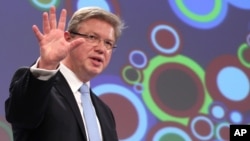BRUSSELS —
The European Union will launch a new round of accession talks with Turkey next month following a three-year hiatus after Germany dropped opposition prompted by Ankara's crackdown on street protests.
Turkey began negotiations to join the EU in 2005, 18 years after applying, but a series of political obstacles, notably over Cyprus and resistance to Turkish membership in Germany and France, have slowed progress.
The new “chapter” of negotiations with the 28-member bloc will open on Nov. 5 and the process should be accelerated to help Ankara implement democratic reforms, EU enlargement commissioner Stefan Fuele said.
“Recent developments in Turkey underline the importance of EU engagement and of the EU remaining the benchmark for reform in Turkey,” he said.
Many EU capitals want to take the long-awaited step on Turkey's path towards the EU, arguing Europe should capitalize on Ankara's rapid growth and rising influence in the Middle East. Others are nervous about an expansion that would see the bloc bordering countries including Syria, Iraq and Iran.
Earlier this month, the European Commission praised recent judicial reforms in Turkey and the government's announcement last month of a package of laws designed to salvage a peace process with Kurdish insurgents.
In its progress report it accused Turkish police, however, of using excessive force to quell protests that started at the end of May, urging the government to strengthen oversight of the police and press ahead with investigations into their conduct.
Six people were killed and about 8,000 were wounded in violence as the protests against Prime Minister Tayyip Erdogan's government swept Turkish cities and police used teargas and water cannon to disperse a sit-in in an Istanbul park.
EU governments, led by Berlin, had postponed plans to launch new talks in June as a rebuke for the handling of the unrest.
'Meaningless obstacles'
The newly opened negotiating chapter - one of more than 30 that need to be discussed before Turkey can join the EU - covers issues dealing with how a country spends EU aid targeted for poor regions.
Turkey's EU affairs minister, Egemen Bagis, welcomed the decision and said he hoped it would mark a new beginning in stalled relations between Ankara and the bloc.
“We hope Turkey's relations with the EU will become more orderly and we will experience a period where illogical, unnecessary and meaningless political obstacles are removed,” he said at a lunch for the EU's outgoing ambassador to Turkey.
Bagis called for the opening of two chapters concerning human rights, freedom of expression and the judiciary, saying the majority of criticism directed towards Turkey in the progress report concerned these areas.
Erdogan, who has bristled at foreign criticism of his handling of the summer unrest and has frequently attacked the EU's attitude towards Turkey, mocked the bloc on Tuesday.
“Is the EU's only preoccupation preparing progress reports on Turkey?” he said in a speech to deputies from his ruling AK Party in parliament.
“The EU is extremely generous in criticizing candidate countries and we are waiting for it to make some self-criticism and write its own progress report.”
Turkey began negotiations to join the EU in 2005, 18 years after applying, but a series of political obstacles, notably over Cyprus and resistance to Turkish membership in Germany and France, have slowed progress.
The new “chapter” of negotiations with the 28-member bloc will open on Nov. 5 and the process should be accelerated to help Ankara implement democratic reforms, EU enlargement commissioner Stefan Fuele said.
“Recent developments in Turkey underline the importance of EU engagement and of the EU remaining the benchmark for reform in Turkey,” he said.
Many EU capitals want to take the long-awaited step on Turkey's path towards the EU, arguing Europe should capitalize on Ankara's rapid growth and rising influence in the Middle East. Others are nervous about an expansion that would see the bloc bordering countries including Syria, Iraq and Iran.
Earlier this month, the European Commission praised recent judicial reforms in Turkey and the government's announcement last month of a package of laws designed to salvage a peace process with Kurdish insurgents.
In its progress report it accused Turkish police, however, of using excessive force to quell protests that started at the end of May, urging the government to strengthen oversight of the police and press ahead with investigations into their conduct.
Six people were killed and about 8,000 were wounded in violence as the protests against Prime Minister Tayyip Erdogan's government swept Turkish cities and police used teargas and water cannon to disperse a sit-in in an Istanbul park.
EU governments, led by Berlin, had postponed plans to launch new talks in June as a rebuke for the handling of the unrest.
'Meaningless obstacles'
The newly opened negotiating chapter - one of more than 30 that need to be discussed before Turkey can join the EU - covers issues dealing with how a country spends EU aid targeted for poor regions.
Turkey's EU affairs minister, Egemen Bagis, welcomed the decision and said he hoped it would mark a new beginning in stalled relations between Ankara and the bloc.
“We hope Turkey's relations with the EU will become more orderly and we will experience a period where illogical, unnecessary and meaningless political obstacles are removed,” he said at a lunch for the EU's outgoing ambassador to Turkey.
Bagis called for the opening of two chapters concerning human rights, freedom of expression and the judiciary, saying the majority of criticism directed towards Turkey in the progress report concerned these areas.
Erdogan, who has bristled at foreign criticism of his handling of the summer unrest and has frequently attacked the EU's attitude towards Turkey, mocked the bloc on Tuesday.
“Is the EU's only preoccupation preparing progress reports on Turkey?” he said in a speech to deputies from his ruling AK Party in parliament.
“The EU is extremely generous in criticizing candidate countries and we are waiting for it to make some self-criticism and write its own progress report.”





